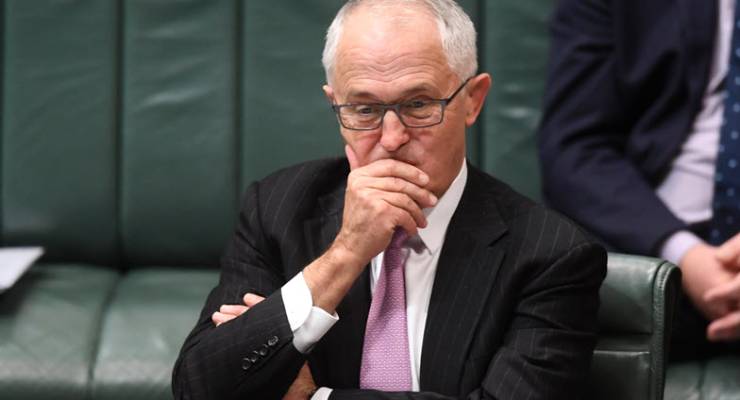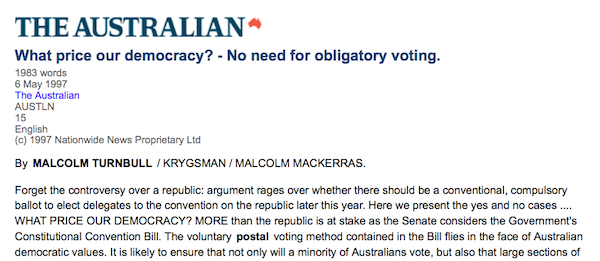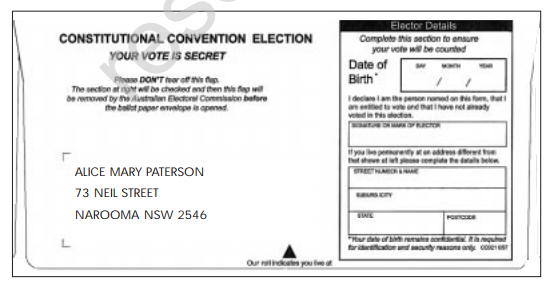
As reports suggest the Turnbull government is seriously considering a postal vote on marriage equality, an article written by Prime Minister Malcolm Turnbull in 1997 shows that he was once opposed to postal votes. Turnbull was adamantly against a proposed postal vote on a constitutional convention for an Australian republic, saying it “flies in the face of Australian democratic values”.
It is almost certain that there will be a Liberal party room showdown on the issue when Parliament returns on Tuesday next week, with four Liberal backbenchers — Tim Wilson, Trent Zimmerman, Warren Entsch and Trevor Evans — pushing for the party to drop its proposal for a plebiscite in favour of a free vote in Parliament.
[Turnbull needs to get marriage equality off the agenda]
This move has led to those opposed to marriage equality within the Coalition — such as Eric Abetz and Barry O’Sullivan — to push hard on an idea also advocated by conservative minister Peter Dutton for the AEC to instead be called upon to conduct a postal vote on the matter. This would not require legislation to pass, and the vote would not be compulsory. The Prime Minister has not indicated whether he is seriously considering the option, but documents obtained by Crikey show Finance went as far as preparing submissions for cabinet on the possibility of a postal plebiscite.
The last time such a vote was undertaken by the government was ahead of the republic referendum in 1998. There was a constitutional convention held, made up of 152 delegates, with half of those delegates appointed by the then-Howard government, and the other half appointed by voters via postal ballot.
Turnbull — then leading the republican movement — did not approve of the postal ballot. In an opinion piece 20 years ago in May 1997, the future prime minister wrote that although Newspoll said that the vote would favour the republican movement, it wasn’t a truly democratic way to go about it.

“A postal ballot of necessity will only reach voters who are living at the address recorded on the electoral roll. Out of 11.8 million voters, it is estimated by the Australian Electoral Commission that as many as 1 million will have changed addresses since the last electoral roll was finalised. These voters will not get their ballot papers. Not unless they ring up and make a special request, and who will get around to doing that? This will particularly hurt young people, many of them students, who move more often than older people settled in families. It will also disfranchise Aborigines from remote communites who are often highly mobile.”
Turnbull also said that the voting forms being in “plain English” would not be useful for someone with poor command of the English language, who would otherwise be able to get assistance from electoral officers at a regular election.
“What will voters do when confronted with a package of material they cannot understand and there is nobody around to explain it? They will throw it in the bin and their vote will be lost.”
Another issue likely to be raised should the postal plebiscite be seriously considered by the government would be the security and privacy of the vote. This was something that concerned Turnbull 20 years ago:
“Postal votes are notoriously insecure. The only security check contained in the method proposed is that the voter should fill in his or her date of birth. Each of our dates of birth are contained in hundreds of databases all over the country. There is probably no piece of information easier to find than a person’s date of birth. There needs to be only a few instances of crooks filling in other people’s ballot papers for the integrity of the process to be impugned.
“And what about secrecy? In the voting booth each of us votes alone. Without the pressure of husband or wife, parent or child. When the postal ballot arrives in the letter box how many people will be compelled to vote one way or other by a strong-willed friend or family member?”
At the time, Turnbull labelled it an “experiment in electoral science” that would only get around 50% turnout of all Australian voters. According to the AEC, only 47% of eligible voters (or 5.3 million people) voted in that poll. And, as Turnbull had predicted, younger voters were less likely to participate in the vote than older voters. The participation rate for 18-25 year olds was 33% compared to 59% for people aged over 65.

Given the government went ahead with the ballot (Turnbull himself was elected to the convention this way) and accepted the outcome of the convention, perhaps he has seen the light on postal plebiscites?
[Marriage equality postal plebiscite plans are much further along than you think]
To be fair to the prime minister, before taking the Liberal leadership in 2015, he also opposed a compulsory ballot box-style plebiscite, suggesting the quickest way to resolve the issue would be a free vote on the floor of the Parliament, so it isn’t the first time he’s changed his position on the issue.








“Lurch and his bright ideas!!!!!”?
I had no idea that, having failed to even propose a binding plebiscite, that they would be idiotic as to consider this nonsense.
Seriously, how much lower can they fall in public regard?
How much lower can THEY fall in public regard?. As far as it takes to loose the next election by a particularly significant margin. Hard to imagine that people who have attained a certain level of education and presumably are socially aware. People who would claim to posses the concepts of justice/equality are in reality bankrupt and self obsessed. Watch, wait and assess, people will reveal themselves.